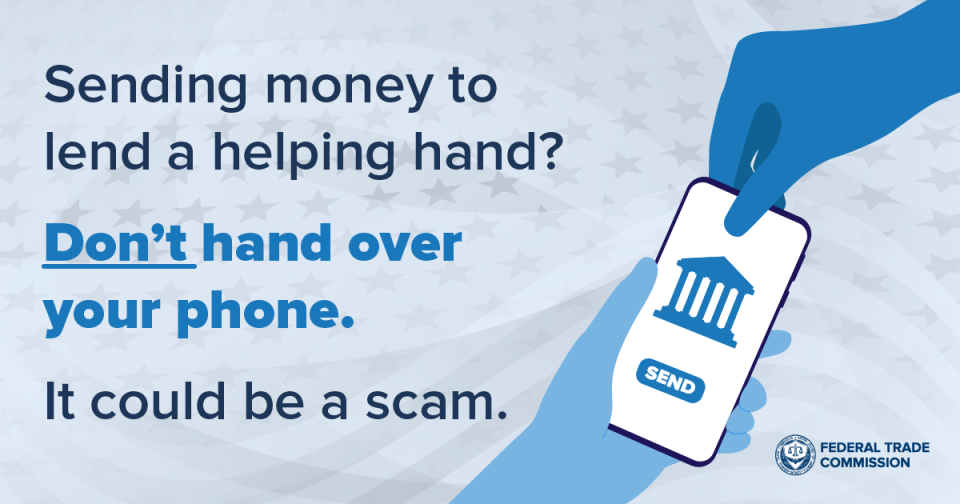Lots of scams start online, but sometimes the scammer parks right next to you at the bank or outside a store. People are reporting millions of dollars lost in a scam that targets active-duty military and plays on their desire to help. In this con, scammers approach servicemembers to ask for help because they lost their debit card and need to pay for something like a hotel room or groceries. They want you to transfer them money using your phone, but it's a scam.
When you agree to help, the scammers tell you to use your phone to log into your banking app and transfer them money. They make up a reason for you to hand over your phone – maybe it’s to enter their information and finish the transfer. That’s when the scammer gets to work sending themselves screenshots of your account information (to use later). Or, they apply for an instant loan in your name and send the money to themselves through Zelle, another payment app, or by wire transfer. Or, the scammer uses a payment app to send themselves money through the app. And while they’re busy moving money around on your phone, the scammer’s sidekick distracts you with chatter about a past deployment.
When someone asks for your help, be safe:
- Never hand your phone over to a stranger who asks for it — even if it seems convenient. Bank accounts have different (and fewer) protections than credit cards, so your bank may not reverse a fraudulent transaction – no matter how large or small.
- Always use two-factor authentication (like a PIN code) for banking and payment apps, so no one else can transfer money through your mobile payment accounts.
- Already sent money to a scammer? Contact your bank or a mobile payment app company immediately. Ask them to reverse the transfer and give your money back.
If a stranger approaches you like this, tell your local police right away. Then, report it to the FTC at ReportFraud.ftc.gov and to your state attorney general.


thank you, thank you very much, thank you for the information.Brazil.
RELATED TO THIS SCAM IS THE NIGERIAN SCAM WHERE THEY WANT TO TRANSFER MONEY TO YOUR BANK ACCOUNT. TYPICALLY SOMETHING ON THE ORDER OF $1000 AND GIVE YOU $500 FOR THE EFFORT. BUT... AND THIS IS THE BIG "BUT", THEY WANT YOU TO SET UP A NEW ACCOUNT AND FURTHER SO THEY CAN SEND YOU MONEY THEY WANT THE LOGIN INFO. SO THEY TRANSFER THE MONEY IN AND OUT INSTANTLY AND SEND IT OVERSEAS, CONVERT TO BITCOIN AND NOW YOU HAVE JUST RECEIVED STOLEN MONEY INTO YOUR ACCOUNT AND IT VANISHED. I HAVE SEEN UP TO $10,000 OFFERED TO DO THIS SERVICE FOR THEM. THE ISSUE IS THAT YOU ARE ON THE HOOK BECAUSE THEY STOLE AN IDENTITY LAUNDERED IT THROUGH YOUR ACCOUNT. NOW WHAT? YOU MAY HAVE SOME LIABILITY
Good grief! Is NOTHING sacred anymore?